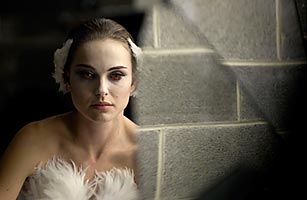
Natalie Portman in a scene from Black Swan
Directed by Darren Aronofsky
With Natalie Portman, Mila Kunis, Vincent Cassel, Barbara Hershey and Winona Ryder
Opens 12.3
Nina, the Prima Ballerina of Black Swan — director Darren Aronofsky's fantastically insane damnation of the ballet business — is a role Natalie Portman was born to play. Chronologically a woman, Nina lives frozen in a little girl's pure, perfect world. In her bedroom full of pink pigs in tutus, she falls asleep to the sound of a music box wound by her hovering mother (a terrifying Barbara Hershey). When she awakes, she dresses in some combination of soft gray, pink or white and goes to Lincoln Center, where she dreams of bringing the same standard of pretty perfection to the stage.
The company's Balanchine-like director, the cold-eyed, elegant Thomas (Vincent Cassel), is putting on Swan Lake. "Done to death, I know, but not like this," he says — which might also be said about Black Swan in reference to cinema's standard aspirational ballet stories. Nina, with her innocence and precision, is ideal to dance the part of White Swan (Odette in the Tchaikovsky original), a princess transmogrified by a sorcerer. But Thomas doubts whether she can handle the other half of the dual role: the seductive, passionate Black Swan. He taunts her by suggesting that newcomer Lily (Mila Kunis, Portman's sexier doppelgänger) would be a better Black Swan. To have her dance her fullest, Thomas wants Nina to break out of her sheltered bubble and live more (unlike Moira Shearer's Vicky in the classic The Red Shoes, whose mentor ordered her to choose between dancing and living). He gives Nina an assignment to masturbate; she tries but is continually stymied. She finds self-mutilation easier. This is a very disturbed young lady, and we don't so much sympathize with her as recoil from what is in her head.
There's a natural comparison here to Aronofsky's The Wrestler, since that tale of strange creative passions made everyone — including members of the Motion Picture Academy — rethink their perception of Mickey Rourke. Black Swan will probably do the same for Portman, who did most of her own impressive dancing for the film. But in its narrative arc, Black Swan is more like Aronofsky's remarkable, harrowing